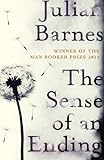 When Julian Barnes’s The Sense of an Ending first came out in 2011 I was initially interested in reading it, then was put off by a few critical reviews of it (something along the lines of it being about schoolboy-adolescent behaviour) and thought I’d look at it in the library before deciding whether or not to read it. A year ago I saw it in a secondhand book shop (Barter Books) and bought it, after a quick glance told me it wasn’t just about adolescents, but I left it languishing on my bookshelves until the other day when I suddenly felt the urge to read it, I don’t know why! It seemed the right time.
When Julian Barnes’s The Sense of an Ending first came out in 2011 I was initially interested in reading it, then was put off by a few critical reviews of it (something along the lines of it being about schoolboy-adolescent behaviour) and thought I’d look at it in the library before deciding whether or not to read it. A year ago I saw it in a secondhand book shop (Barter Books) and bought it, after a quick glance told me it wasn’t just about adolescents, but I left it languishing on my bookshelves until the other day when I suddenly felt the urge to read it, I don’t know why! It seemed the right time.
Well, I really liked it (so much for reading reviews – it’s better to make up your own mind). It’s about memory and the effect of time, about ageing, about the nature of history and literature, about nostalgia and the question of responsibility.
It’s not a long book – just 150 pages – and I read it in two sittings. But its length belies its complexity and it’s actually quite a puzzle, because the narrator Tony knows that his memory is unreliable, that he can’t be sure of the actual events of his life. The best he can do is to be true to the impressions of those events that have remained with him. As he says at the beginning of the book:
… what you end up remembering isn’t always the same as what you have witnessed. (page 3)
Later on he realises that:
… as the witnesses to your life diminish there is less corroboration, and therefore less certainty, as to what you are or have been. (page 59)
The first part of the book is about Tony and his friends at school. There were three of them initially, then Adrian joined their clique. All of them were pretentious, but Adrian was rather different – he pushed them ‘to believe in the application of thought to life, in the notion that principles should guide actions.‘ (page 9)
Gradually, after they finished school and went their various ways through university, their contact with each other became less frequent. Tony’s relationship with his girlfriend, Veronica ends but he is less than happy when Adrian and Veronica began to see each other. Soon after Tony learns that Adrian committed suicide. Years later, after Tony has retired, he is shocked when he receives a letter telling him that Veronica’s mother has left him £500 and Adrian’s diary. However, Veronica has possession of the diary and refuses to hand it over to Tony, stating that she was not ready to part with it yet. The rest of the book concerns Tony’s efforts to get the diary and to work out what actually happened to Adrian.
Of course, it is not straight- forward as Tony meets with the brick wall that his memory has put between him and Veronica. And for the reader this poses a problem, because we see events through Tony’s words, what he says he did and thought, and what he thought about other people and their actions. He wants to know why Adrian committed suicide, what happened between him and Veronica, and how come her mother had Adrian’s diary. His memories are suspect and he knows it and it does not help him (or the reader) that Veronica is so unhelpful and tells him he ‘just doesn’t get it … You never did and you never will‘.
Just what did happen is never stated explicitly and the reader is left to puzzle it out with just a few clues. I’m not sure I got the whole picture, but I enjoyed trying to unravel the mystery. In the end I think it illustrates the nature of memory rather than being concerned about what actually happened, because as Adrian says:
History is that certainty produced at the point where the imperfections of memory meet the inadequacies of documentation. (page 17)
I’ve read this three times now and I don’t think even yet I’ve begun to mine all that is going on. The one thing I would question in respect of what you’ve said is that I’m not sure it is only Tony’s memory that is unreliable, Sometimes I think there is some wilful disguising of what he knows happened. I suspect his version of events is unreliable in more ways than one.
LikeLike
I think I need to reread it – as you say there is so much in it. And yes, I can see that Tony’s ego and self-centredness (is that a word?) may very well cause him to disguise what he did – did he really forget what he wrote to Adrian?
LikeLike
Sounds like a good one, glad you enjoyed it. You are right, one must review for one self, after all if we all liked the same thing, it would be a very boring world.
LikeLike
Margaret – What an interesting take on memory, the passage of time, and relationships among members of a group. And I do like that exploration of the question of how reliable our memories really are.
LikeLike